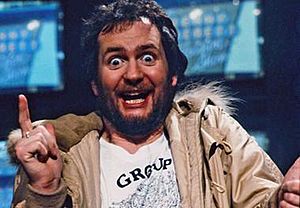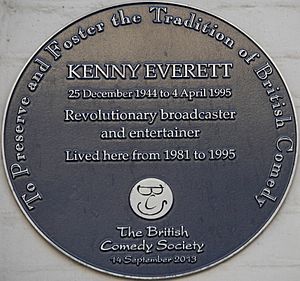Kenny Everett facts for kids
Quick facts for kids Kenny Everett |
|
|---|---|
 |
|
| Birth name | Maurice James Christopher Cole |
| Born | 25 December 1944 Seaforth, Lancashire, England |
| Died | 4 April 1995 (aged 50) London, England |
| Medium | Radio, television |
| Years active | 1962–1994 |
| Genres | Character comedy, surreal comedy, sketch |
| Spouse |
Lee Middleton
(m. 1969; div. 1984) |
| Notable works and roles | See below |
Kenny Everett (born Maurice James Christopher Cole; 25 December 1944 – 4 April 1995) was a famous English comedian, radio DJ, and TV presenter. He started his career on "pirate radio" stations in the mid-1960s. These were radio stations that broadcast from ships at sea.
Later, he became one of the first DJs on the new BBC Radio 1 in 1967. Here, he created his unique voices and funny characters. He later brought these characters to television. Kenny Everett was very talented. He could write his own scripts, create catchy jingles, and use advanced recording equipment. He was also a popular guest on many chat shows and game shows.
Kenny Everett became unwell in 1989 and sadly passed away in 1995.
Contents
Early Life and Beginnings
Maurice James Christopher Cole was born on Christmas Day in 1944. His family lived in Seaforth, near Liverpool, England. He went to a local school and later attended a special school to train as a choirboy.
After school, he worked in a bakery. He also worked in the advertising department of a newspaper.
Kenny Everett's Radio Career
Starting on Pirate Radio
Kenny Everett's first chance in radio came in 1962. He sent a tape to the BBC. He was offered a job, but he chose to work for "pirate radio" instead. He started as a DJ for Radio London in 1964.
While working there, he was told to change his name. He chose "Everett" from an American actor he admired. Kenny teamed up with Dave Cash for the Kenny & Cash Show. This show became very popular on pirate radio. His unique style and friendly personality quickly made him famous.
Joining BBC Radio 1
In 1967, Kenny Everett joined the newly created BBC Radio 1. He continued to develop his special way of presenting. His shows featured silly voices, funny characters, and his own created jingles. He even convinced the BBC that the new station needed jingles.
His shows on Radio 1 included Midday Spin. In 1968, he started hosting a popular Saturday morning show.
Moving to Commercial Radio
In 1973, new laws allowed commercial radio stations in the UK. Kenny Everett joined Capital Radio. He started with a weekend show, where he developed more of his unique ideas.
In 1974, he began hosting the breakfast show with his old friend Dave Cash. This brought back the "Kenny and Cash" show. Kenny loved using sound recording equipment. He often added layers of sound to his recordings. He also created his own radio jingles.
In 1975, Kenny found early mornings too difficult. He moved to weekend shows at Capital Radio. Here, he continued to build his fan base. He played both great music and what he thought was the "worst" music. This led to his popular Kenny Everett's World's Worst Record Show.
Kenny Everett played a big part in getting the band Queen's song "Bohemian Rhapsody" released as a single in 1975.
Later Radio Work
Kenny Everett returned to BBC Radio in 1981. He hosted a Saturday show on Radio 2. This show ran until 1983.
He went back to Capital Radio in 1984. He continued his Saturday lunchtime show. In 1988, he started hosting daily shows on Capital Gold. He worked there until 1994, when his health made it impossible to continue. In that same year, he won a special award for his contributions to radio.
Radio Show Timeline
- Kenny & Cash Show, Radio London, 1964–65
- Kenny Everett Audio Show, Radio Luxembourg, 1966
- Midday Spin, BBC Radio 1, 1967
- Foreverett, BBC Radio 1, 1968
- Everett is Here, BBC Radio 1, 1969–1970
- Kenny Everett Radio Show, BBC Local Radio, 1971
- Kenny Everett Radio Show, BBC Radio 1, 1973
- Breakfast Show, Capital Radio, 1973–74
- Kenny Everett Audio Show/Cassette, Capital Radio, 1974–1980
- Kenny Everett Audio Show/Cassette, Radio Victory, 1975–76
- Captain Kremmen, Capital Radio, Radio Victory, 1976–80
- Kenny Everett Radio Show, BBC Radio 2, 1981–1983
- Kenny Everett Audio Show, Capital Radio, 1984–1988
- Weekday afternoons, Capital Gold, 1988–1991
- Weekday mid-mornings, Capital Gold, 1991–1994
Kenny Everett on Television
Kenny Everett first appeared on screen in a 1965 film called Dateline Diamonds. He also appeared in several TV series. In 1968, he was in a show called Nice Time. He made three more series for London Weekend Television in 1970.
In 1973, Kenny Everett hosted seven episodes of Top of the Pops. He also provided the voice for 'Charley' in the Charley Says animated public information films. He was the announcer for the game show Celebrity Squares from 1975 to 1979.
He was a frequent guest on the BBC quiz show Blankety Blank. On his first appearance in 1979, he famously bent the host Terry Wogan's microphone. This became a running joke whenever Kenny appeared on the show. He also hosted two short quiz shows later in his career.
The Kenny Everett Video Show
In 1978, Thames Television offered Kenny Everett a new show. It was called The Kenny Everett Video Show. This show was a way for Kenny to show off his characters and comedy sketches. It also featured the latest pop music. Sometimes the artists performed themselves. Other times, dance routines by Arlene Phillips' dance group Hot Gossip were shown.
Many pop and TV stars appeared on the show. These included Rod Stewart, Kate Bush, Cliff Richard, and Freddie Mercury.
The show also featured stories about Captain Kremmen. He was a science fiction hero voiced by Kenny Everett. Captain Kremmen traveled the galaxy fighting alien bad guys. He was joined by his assistant Dr Gitfinger and his sidekick Carla. In the first three series, these parts were cartoons. In the fourth series, Captain Kremmen was played by actors.
The show ran for four series on ITV. The last episode of Series 3 ended with Kenny giving a farewell speech. The set was taken apart around him. The final shot showed Kenny being put into a giant dustbin. The fourth series was called The Kenny Everett Video Cassette. It focused more on comedy sketches than music.
The Kenny Everett Television Show
Kenny Everett had some disagreements with Thames Television. The BBC then offered him a new comedy show. It started with a Christmas special in 1981. Then, five more series were made between 1982 and 1988. The BBC invested more money, which improved the show's quality.
Thames Television tried to stop Kenny from using his old characters on the BBC. This didn't work, but it led to him creating many new characters for the BBC show.
Television Show Timeline
- Nice Time, Granada Television, 1968
- The Kenny Everett Explosion, LWT, 1970
- The Kenny Everett Video Show, Thames Television, 1978–1980
- The Kenny Everett Video Cassette, Thames Television, 1981
- The Kenny Everett Television Show, BBC1, 1981–1988
- Brainstorm, BBC1, 1988
- That's Showbusiness (team captain), BBC1, 1989–1991
- Gibberish, BBC1, 1992
Music and Film Work
In 1977, Kenny Everett worked with Mike Vickers. They released a single called Captain Kremmen. This song was based on one of his comedy characters. It reached number 32 in the UK music charts.
In 1983, Kenny Everett released the single "Snot Rap". This song was supposedly sung by two of his TV characters, Sid Snot and Cupid Stunt. It reached number 9 in the UK charts. A follow-up song, "Snot Rap – Part II", was released in 1985.
Kenny Everett also made one film. It was called Bloodbath at the House of Death (1984). This film was a funny spoof of horror movies. Many popular comedians and actors appeared in it.
Personal Life
Kenny Everett married singer Audrey "Lady Lee" Middleton in 1969. They separated in 1979.
Kenny Everett became very good friends with Freddie Mercury. Freddie Mercury was the lead singer of the band Queen. They met on Kenny's radio show in 1974. Freddie Mercury passed away in 1991.
Legacy and Tributes
In 1981, Kenny Everett co-wrote a book about his life. It was called The Custard Stops at Hatfield.
After his death, a compilation album of his radio work was released. It was called Kenny Everett At The Beeb. This album included clips from his BBC Radio shows.
Many TV shows have been made to celebrate Kenny Everett's life and career. In 1997, an episode of Heroes of Comedy focused on him. It covered his journey from pirate radio to his death. Many celebrities shared their memories of working with him.
In 2007, ITV1 broadcast a tribute show called Licence to Laugh. This show celebrated 30 years since his first TV appearance. Friends and colleagues talked about knowing "Cuddly Ken." Other famous people, like Chris Moyles, also spoke about how Kenny influenced them.
A documentary called When Freddie Mercury Met Kenny Everett was shown on Channel 4. It told the story of the friendship between Kenny and Freddie Mercury.
In 2012, the BBC broadcast a TV movie about Kenny Everett. It was called The Best Possible Taste. This film focused on his relationship with his wife, Lee Middleton.
Kenny Everett was also played by an actor in the 2018 film Bohemian Rhapsody. This movie was about the life of Freddie Mercury.
 | William L. Dawson |
 | W. E. B. Du Bois |
 | Harry Belafonte |


